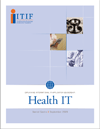
Greater use of information technology (IT) in health care can help achieve many health care reform goals. Health IT can improve the effectiveness and efficiency of health care by reducing costs, improving the quality of care, and increasing access to health care services and information. Health IT also contributes to broader health care goals such as creating a more patient-centric health care system by empowering individuals to better manage their own health care and enabling them to communicate more easily with their health care providers. Finally, health IT increasingly serves as the foundation for medical research, opening up new pathways for drug discovery and enabling comparative effectiveness research. However, progress in the adoption of health IT varies significantly between nations, suggesting that progress is not limited by the costs, quality or usefulness of the technology, but rather by other factors that nations can influence.
The purpose of this report is to identify which countries are leading in the deployment of health IT and to draw lessons that might be useful for other countries. The first section of the report gives an overview of the current state of and trends in health IT adoption in the United States and several other developed countries. Our analysis of available literature and data indicate that three countries - Denmark, Finland, and Sweden - are definitively ahead of the United States and most other countries in moving forward with their health IT systems. These three Nordic countries have nearly universal usage of electronic health records (EHRs) among primary care providers, high rates of adoption of EHRs in hospitals, widespread use of health IT applications, including the ability to order tests and prescribe medicine electronically, advanced telehealth programs, and portals that provide online access to health information. All three countries have embraced IT as the foundation for reforming their health care systems and have successfully implemented changes that reach every patient. These nations show the transformations possible in health care today through the greater use of IT. Any nation that is not at or ahead of this level is missing substantial opportunities.
Download Explaining International IT Application Leadership: Health IT (.pdf 3.304 KB).
Download from eHealthNews.EU Portal's mirror: Explaining International IT Application Leadership: Health IT (.pdf 3.304 KB).
For further information, please visit:
http://www.itif.org
About The International Technology and Innovation Foundation
The International Technology and Innovation Foundation is a non-partisan research and educational institute - a think tank - whose mission is to formulate and promote public policies to advance technological innovation and productivity internationally, in Washington and the states.